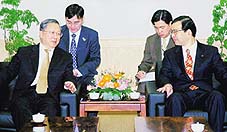JCP chair and Chinese NPC vice chair discuss Japan-China relations
 JCP executive Committee Chair Shii Kazuo (right) and Chinese National People's Congress Vice-Chairperson Lu Yongxiang (left) (April 15, JCP head office, Tokyo) |
Lu Yongxiang, who led a delegation visiting Japan at the invitation of the Japanese House of Representatives Speaker, opened his remarks by commending the JCP for its position toward historical issues that involve relations between the two countries, pointing out that the JCP and the Communist Party of China maintain friendship and mutual cooperation.
While pointing out that Japan and China, which are geographically very close to each other, have two thousand years of history of exchanges and remain major trade partners maintaining relations of co-prosperity, he said that the Chinese people are fed up with the Japanese government's failure to deal properly with the historical issues.
Lu Yongxiang said that although recent anti-Japanese demonstrations have been prompted by the Japanese government's attitude toward historical issues, use of violence must be rejected. He said people should act in conformity with the law. He also expressed hope that the JCP in this regard will exert its influence to help develop Japan-China relations.
Giving the Chinese NPC delegation a warm welcome, JCP Chair Shii stated that he is pleased to see good relations being developed by the JCP and the CPC which share a history of common struggle in opposition to war of aggression.
He also expressed concern about the worsening relations between the two peoples. "One of the causes of the deterioration is the fact that in Japan there are some who try to propagate views affirming and even glorifying the history of the Japanese war of aggression and colonialism," he said.
Shii went on to say:
"The world order was established after World War II on the basis of a condemnation of the war of aggression by Japan, Germany, and Italy. If Japan refuses to accept this foundation, it will lose its right to be a legitimate member of Asia and the world community. It is from this viewpoint that we have stated our critical view of Prime Minister Koizumi Jun'ichiro's visit to Yasukuni Shrine and the government's approval of a history textbook that asserts that the Japanese war of aggression was justifiable. Germany could earn its neighboring countries' trust because it expressed remorse for its war of aggression. I believe that Japan should follow this example and admit that its war of aggression against China was a grave mistake, so that it can share the historical fact with China and make efforts to develop relations with China to become friends who work together for a bright future."
Having said this, Shii said he hopes that Chinese people take into account the following three points:
First, the Japanese war of aggression and the present business activities carried out in China by Japanese firms must not be considered to be the same.
Until the end of the war of aggression, Japanese products were a symbol of Japanese economic aggression that gave rise to a boycott in China. Today, Japanese business activities are based on agreements between the two countries. It is necessary to develop Japan-China economic relations in a way that will serve the interests of both peoples.
Second, although some Japanese politicians go against the lessons of history, they must not be seen as representing the opinions of the Japanese people. A great majority of the Japanese people wish for peace and want to prevent Japan from making the same mistake in going to war again. Developing solidarity between the Japanese and Chinese people is very important.
Third, the use of violence must be rejected as a means of expressing protests or criticism of the reactionary moves of some Japanese leaders. It is important to maintain a reasoned and calm attitude in dealing with any questions.
Shii requested Chinese NPC Vice Chair Lu Yongxiang to let the Chinese government know that the JCP hopes every necessary step will be taken to ensure the safety of Japanese residents and firms as well as the Japanese embassy.
Lu commended the JCP for maintaining a firm position on issues in difficult times and said that the three points raised by Shii were all understandable, adding that "the Chinese people will endorse that position."
He said that historically, the Chinese have distinguished the handful of Japanese militarists from the general public as well as some politicians who hold a distorted historical outlook. Distinguishing present economic relations and friendship from what went down in history, China will protect the safety of Japanese and other foreign residents and firms.
Shii said, "I feel pleased to find that we have agreement on the basic issues. Let us do our utmost to increase friendship between Japan and China." (Akahata, April 16, 2005)
|
HOME:www.jcp.or.jp/english |